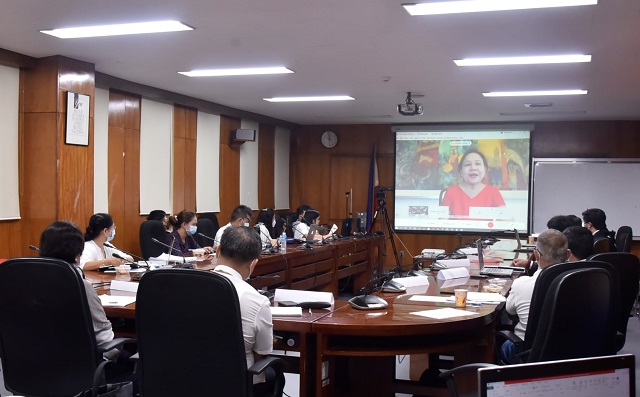
As the country achieves its all-time high rice production of 19.3M MT in 2020, the Department of Agriculture-Philippine Rice Research Institute (DA-PhilRice) reported that it has already achieved 100% seed deliveries for the dry season and has reached agri workers and farmers amidst limitations on face-to-face activities.
In the recent annual review of the Rice Competitiveness Enhancement Fund (RCEF) programs on Seed and Rice Extension Services (RESP), Sen. Cynthia Villar, chairperson of the Senate Committee on Agriculture and Food, commended PhilRice for achieving its target.
“I congratulate DA-PhilRice for achieving its targets despite the threat and the limitations that the current pandemic has brought us,” Villar said during the said online review of the RCEF Seed and RESP Programs.
Through the RCEF-Seed program, 1.7 M bags of high-quality inbred rice seeds were delivered to 957 municipalities from the target 55 provinces all over the country as of Feb. 7.
More than half a million farmers-beneficiaries received 1.5 M bags or 87% of the distributed bags. In coordination with LGU partners, DA-PhilRice is continuously working to distribute the remaining seeds until end of February.
Some 1,600 trainers across the country were also taught on rice crop production, modern rice farming techniques, seed production, and farm mechanization.
“We have reached more farmers and extension workers for the past two years of RCEF implementation. We will even more intensify our efforts for 2021 as we ensure that we deliver the information and technology that farmers need the most to increase their yield and reduce production cost,” said Karen Eloisa T. Barroga, vice-chair of the Technical Working Group of RCEF- RESP.
Four different types of training with different durations and participants have been conducted to help improve yield while lowering cost in rice production. For PhilRice, these trainings include Rice Specialists’ Training Course, Training of Trainers, Farmer Field School, Palay-aralan (online), and seminars/field days. The Institute co-implements RESP with Agriculture Training Institute (ATI) and Philippine Center for Postharvest Development and Mechanization (PHilMech) under DA and Technical Education and Skills Development Authority (TESDA).
As the participants come from different provinces, trainings have been modified methodically to cope with the movement restrictions due to the global pandemic. The training graduates are farmers, farm owners/staff, and government employees from ATI, TESDA, and local government agricultural offices.
On communication services, DA-PhilRice developed more than 200 IEC materials in the form of leaflets, posters, flipcharts, handouts, flash cards, technology calendars, and videos that cover topics on modernized rice production.
About 3 million copies of these materials were produced and currently being distributed to the farmers while social media posts reached about 3 million engagement. DA-PhilRice survey showed that 97% of about 3,500 rice farmers who watched the videos and received the leaflets during RCEF seed distribution found the materials useful in increasing their knowledge on rice production. This year, information on land preparation, crop establishment, and nutrient and pest management will be significantly disseminated.
Agriculture Secretary William Dar, meanwhile, encouraged PhilRice to continue strengthening ties with local government units (LGUs) so that partners will be more motivated in taking their part on national programs.
“We have to be strategic, inclusive, and collective, so that partners like LGUs will do their share because they are the leaders in their respective units. Our direction is working towards a province-led agriculture, fishery, and extension system,” he said.
Dar further emphasized the holistic approach of the department called ONE-DA that aims to pursue inclusive approach to accelerate the transformation toward a modern and industrialized Philippine agriculture.
“All strategies are being mobilized to make it possible that we take with us our rice farmers in our journey for development. We really want our farmers to improve their yield while lowering their production cost,” he said.
“Among our ways forward this year is the intensified partnership with DA Regional Field Offices, LGUs, and other stakeholders,” said Dr. Flordeliza Bordey, RCEF-Seed Program director.
The distribution of seeds to rice farmers and rice production training programs are stipulations under the Rice Tariffication Law.




